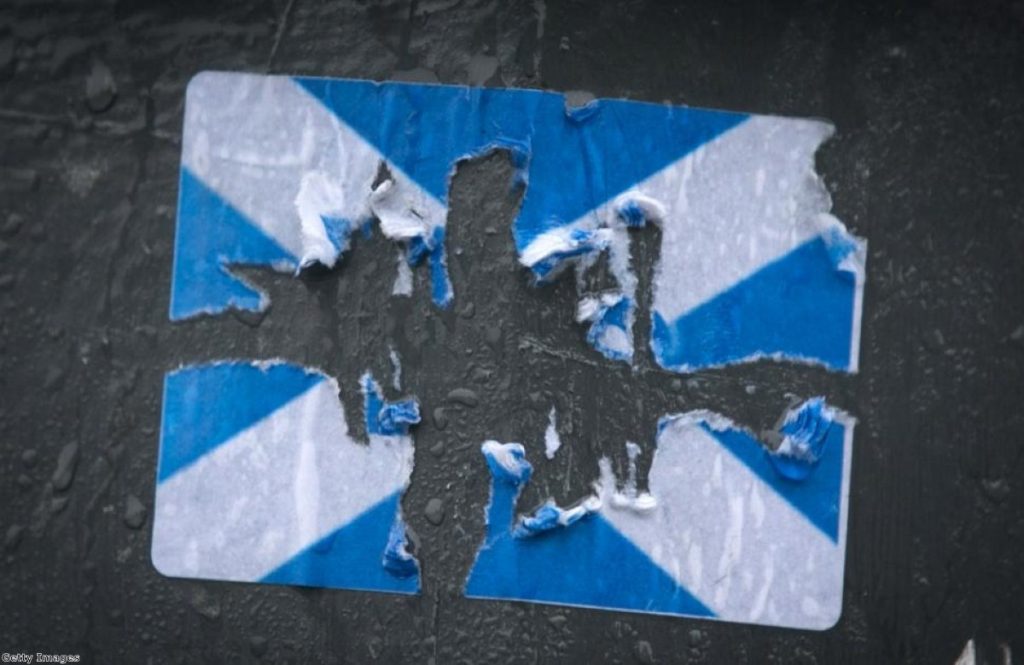The Week in Review: New wounds open as Scotland divides
Sorry to put a bit of a downer on things, but this hasn't been a great week for the United Kingdom.
Yes, it's mission accomplished. The 307-year-old union has been saved, and by a healthy ten-point margin that any leading 'No' campaigner would have grabbed with both hands.
But the price to pay has been a bruising and divisive struggle which leaves Scotland a society riven by disagreement over its future. It is split, more or less down the middle, between those who have been denied their wish for independence and those wanting to remain in Britain.
The devo-max settlement now set to be rushed through the Westminster parliament won't help fix this. It was priced into the market by voters yesterday because David Cameron, Ed Miliband and Nick Clegg made clear the status quo wasn't on the ballot paper.


We now enter a new phase of "democratic renewal" forced on the party leaders by events barely inside their control. Consensus forged in the panic-heated atmosphere of the independence referendum will be sorely tested as thoughts turn to the 2015 general election. From Sunday, the Labour party convenes in Manchester to plot its return to power next year. As always when tweaking the rules of the game, mutual suspicion and mutual plotting for secret partisan advantage will play an unpleasantly prominent role.
That's for the near future. This week, the desperate campaigning to ensure this historic moment for Scotland went the right way has produced an unusual casualty. We can debate for hours who of Cameron, Alex Salmond, Miliband or Alistair Darling are the real winners. In any list, though, the people of Scotland should be listed at the bottom.
In the hardest-fought areas, activists on the frontline have been bruised. At last night's Better Together event, one Glaswegian told me he had been called "scum" non-stop for three hours in his get-out-the-vote session. Nationalists have complained of hostility the other way, too, though; unionist anger has probably been under-reported by the hordes of London-based journalists who've descended on Scotland at the last-minute. Resentment at media bias in the campaign will linger for many years. So too may the conduct of the campaign, and the changing nature of what 'Yes' and 'No' actually meant.
Nor is this a case of passionate nationalists being denied their wish by a silent majority, who as Alistair Darling declared this morning "have now spoken". I must have invited at least 100 people on the streets of Scotland to give their views on independence earlier this week; just because those who shook their heads and hurried past declined to speak out doesn't mean they didn't hold strong feelings. The three Westminster parties believed in the union passionately, too – they just struggled to find a way of articulating their belief until Gordon Brown's speech of the campaign on Wednesday.
As the ex-prime minister showed, belief counts for a lot in politics. And while the man responsible more than any other for all this trouble was booed loudly by No campaigners during his concession speech early this morning, Salmond should not be disparaged for acting out of conviction. I quizzed him at the start of the week about his views of Scottish values, a question that had perplexed me throughout the summer. His answer was to offer a welfare-focused left-wing country setting itself apart from the right-wing politics of small-minded England. Salmond gave everything to this campaign; it's no wonder he's now decided to step aside from the top job.
Meanwhile, Britain needs to do some serious pondering too. This week its politicians somehow combined to counter the nationalist threat. Now they can relax – and get back to disagreeing over how exactly to go about the UK's reconstruction.

